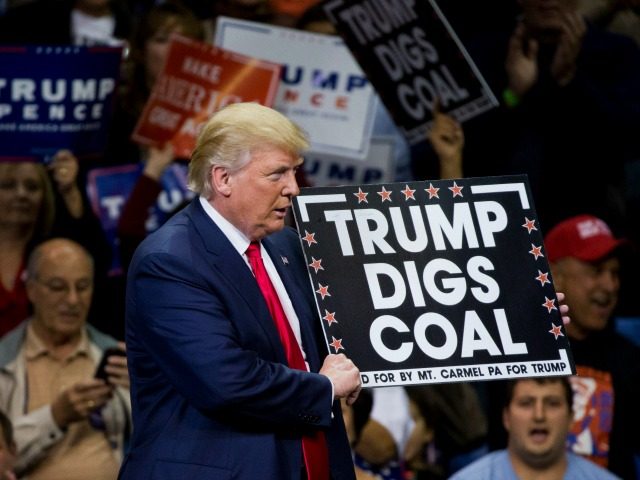After liberal pundits and mainstream media reporters mocked President Donald Trump for vowing to fight for Pittsburgh instead of Paris on Thursday, New York Times demographics expert Nate Cohn wondered if the media and their allies on the left still had not figured out how much Trump’s America-first message appeals to working-class voters, especially those in the Rust Belt.
“I was elected to help the citizens of Pittsburgh, not Paris,” Trump said in his Thursday Rose Garden speech that announced the United States’s withdrawal from the Paris climate accord. “It is time to put Youngstown, Ohio; Detroit, Michigan; and Pittsburgh, Pennsylvania, along with many other locations within our great country, before Paris, France. It is time to make America great again.”
Forget for a minute that mainstream media reporters always say that Trump should fight for Americans who did not vote for him (like those in Pittsburgh, presumably), the media and the punditocracy ridiculed Trump on Twitter, gleefully tweeting that Trump did not carry Pittsburgh in 2016. Pittsburgh’s mayor, a Democrat (something media outlets conveniently omitted during some of his appearances), also chimed in on Twitter.
Cohn, though, tweeted that “this is the kind of issue/message that won Trump so many Obama voters” because “it pits traditional Dem. industrial base against” the “progressive left.”
“Based on response, [I’m] not sure people have grappled with the extent that Trump’s pro-industrial message is popular with key ex-Dem voters,” he continued.
This is the kind of issue/message that won Trump so many Obama voters. It pits traditional Dem. industrial base against progressive left
— Nate Cohn (@Nate_Cohn) June 1, 2017
Based on responses, I'm not sure people have grappled with the extent that Trump's pro-industrial message is popular with key ex-Dem voters
— Nate Cohn (@Nate_Cohn) June 1, 2017
Stanley Greenberg, the Democrat who was Bill Clinton’s top pollster and has written about the importance of “Reagan Democrats” in Macomb County, recently wrote that Democrats have a “working-class problem.” He took it a step further, writing in the American Prospect that Democrats do not just have a “white working-class problem” because “Democrats have lost support with all working-class voters across the electorate, including the Rising American Electorate of minorities, unmarried women, and millennials.” Greenberg said this “decline contributed mightily to the Democrats’ losses in the states and Congress and to the election of Donald Trump.”
“The road to a sustainable Democratic majority—nationally, locally, and in the states—must include much higher Democratic performance with white working-class voters (those without a four-year degree),” Greenberg wrote.
Trump carried key swing states like Ohio, Pennsylvania, Wisconsin, and Michigan because he won blue-collar whites by nearly a 40-point margin over Hillary Clinton.
As the Mayor of Pittsburgh, I can assure you that we will follow the guidelines of the Paris Agreement for our people, our economy & future. https://t.co/3znXGTcd8C
— bill peduto (@billpeduto) June 1, 2017
President Trump triumphantly announced that he was elected by Pittsburgh rather than Paris. Well, actually, he lost in Pittsburgh.
— Carl Bildt (@carlbildt) June 1, 2017
Funny that #Trump mentioned Pittsburgh. Clinton carried Allegheny County 363,017 to 257,488 for Trump. https://t.co/gG4MOenSv5
— EJ Dionne (@EJDionne) June 1, 2017
Trump lost Pittsburgh. And he won in Paris, Maine; Paris, Tenn; Paris, Ark.; Paris, Idaho; Paris, Missouri; Paris, Penn.; Paris, Texas.
— Matt Viser (@mviser) June 1, 2017
This “#actually, Trump Lost Pittsburgh” fad is one of the dumbest anti-Trump retorts that center/center-left media has ever come up with.
— Alan Cole (@AlanMCole) June 1, 2017
“I was elected to represent the citizens of Pittsburgh, not Paris.” (Trump lost Pittsburgh!) pic.twitter.com/Nw7Vkx7ygF
— Eli Yokley (@eyokley) June 1, 2017
Oh dear.
Pittsburgh, which Trump lost, made it into the speech twice.
I bet he never mentions the city again while president …
— Annie Linskey (@AnnieLinskey) June 1, 2017
Cohn–who has also argued that there are reasons to be skeptical that ex-FBI Director James Comey’s letter cost Clinton the election–was one of the few mainstream media reporters who did not “beclown” himself during the 2016 election cycle.
When those in the legacy media, Democrats, and the Republican establishment were insufferably insisting that Republicans could not win a general election without pandering to Hispanics and supporting massive amnesty legislation (those who had contrary viewpoints were treated as if they thought the earth was flat), Cohn noted in 2014 that Republicans indeed had a path to the White House without the Latino vote.
And in June of 2016, Cohn also pointed out that, “there are more white voters than people think… that’s good news for Trump”:
One of the biggest reasons Donald Trump is considered to be a long shot to win the presidency is the diversity of the country.
As Joe Scarborough of MSNBC put it, “There are not enough white voters in America for Donald Trump to win while getting routed among minorities.”
But a growing body of evidence suggests that there is still a path, albeit a narrow one, for Mr. Trump to win without gains among nonwhite voters.
And yet, Cohn’s editors at the New York Times were shellshocked on election night. Clearly, the out-of-touch and insular editors at his publication had not been reading one of their own’s cogent analysis throughout and leading up to the 2016 election cycle.

COMMENTS
Please let us know if you're having issues with commenting.